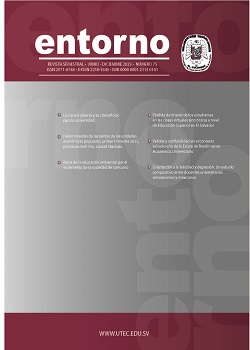Validity and reliability of the Resilience at University Scale in the Salvadoran context
Published 2023-01-01
Keywords
- Quality of education - El Salvador,
- Academic performance,
- Psychometry,
- University students,
- Learning aptitude
Copyright (c) 2023 Universidad Tecnológica de El Salvador

This work is licensed under a Creative Commons Attribution-NonCommercial-ShareAlike 4.0 International License.
How to Cite
Abstract
Academic performance constitutes an essential value that helps to measure quality in education, and it is linked to a series of factors which exert an influence in the learner, thus impacting either positively or negatively in the achievement of educational skills; however, in the Salvadoran context, there is no instrument to measure this variable. This study analyzes the psychometric properties of the Resilience at University Scale within the Salvadoran context. The study is instrumental with a retrospective design. A non-probabilistic snowball sampling was selected, surveying a total of 487 Salvadoran university students. The overall mean age of the sample was 21.84 with a standard deviation (SD) of 2.74. Based on gender, the mean age of women was 21.55 (SD = 2.62) and the mean age of men was 22.14 (SD = 2.84). Data collection was carried out via a digital survey through the Google Forms platform. The results indicate that the scale has adequate psychometric properties of validity and reliability to be used in the Salvadoran context; nevertheless, six items were excluded because they obtained lower than expected factor loads, therefore preserving the original structure, but with 14 items.
References
- Barrera Hernández, L. F., Sotelo Castillo, M. A., Barrera, R. A. y Aceves Sánchez, J. (mayo-agosto, 2019). Bienestar psicológico y rendimiento académico en estudiantes universitarios. Enseñanza e investigación en psicología, 1(2), 245-251. https://revistacneip.org/index.php/cneip/article/view/42/33
- Bollen, K. A. (1989). Structural equations with latent variables. John Wiley y Sons. https://onlinelibrary.wiley.com/doi/book/10.1002/9781118619179
- Browne, M. W. y Cudeck, R. (1992). Alternative ways of assessing model fit. https://journals.sagepub.com/doi/abs/10.1177/0049124192021002005
- Escobedo Portillo, M. T., Hernández Gómez, J. A., Estebané Ortega, V. y Martínez Moreno, G. (2016). Modelos de ecuaciones estructurales: Características, fases, construcción, aplicación y resultados. Ciencia & trabajo, 18(55), 16-22. https://dx.doi.org/10.4067/S0718-24492016000100004
- Ferrando, P. J. y Anguiano-Carrasco, C. (enero-abril, 2010). El análisis factorial como técnica de investigación en psicología. Papeles del psicólogo, 31(1), 18-33. https://www.redalyc.org/pdf/778/77812441003.pdf
- Garbanzo Vargas, G. M. (2007). Factores asociados al rendimiento académico en estudiantes universitarios, una reflexión desde la calidad de la educación superior pública. Revista educación, 31(1), 43-63. https://www.redalyc.org/pdf/440/44031103.pdf
- Hair, J. F. y Anderson, R. E. (2004). Análisis multivariante. Pearson. https://es.pdfdrive.com/analisis-multivariante-d33823228.html Hernández González, O. (2021). Aproximación a los distintos tipos de muestreo no probabilístico que existen. Revista cubana de medicina general integral, 37(3), 1-3. http://scielo.sld.cu/pdf/mgi/v37n3/1561-3038-mgi-37-03-e1442.pdf
- Herrero, J. (diciembre, 2010). El análisis factorial confirmatorio en el estudio de la estructura y estabilidad de los instrumentos de evaluación: un ejemplo con el cuestionario de autoestima CA14. Psychosocial intervention, 19(3), 289-300. https://scielo.isciii.es/pdf/inter/v19n3/v19n3a09.pdf
- Hu, L. y Bentler, P. (1998). Fit indices in covariance structure modeling: Sensivity to underparameterized model misspecification. Psychological methods, 3(4), 424-453. https://psycnet.apa.org/doiLanding? doi=10.1037%2F1082-989X.3.4.424
- Junta de Vigilancia de la Profesión en Psicología. (2021). Código de ética de la profesión en psicología. CSSP. https://cssp.gob.sv/wp-content/uploads/2017/05/C%C3%93DIGO-DE-%C3%89TICA-ACTUALIZA DO.pdf
- Lloret-Segura, S., Ferreres-Traver, A., Hernández-Baeza, A. y Tomás-Marco, I. (octubre, 2014). El análisis factorial exploratorio de los ítems: Una guía práctica, revisada y actualizada. Anales de psicología, 30(3), 1151-1169. https://doi.org/10.6018/analesps.30.3.1 99361
- Losada, A. V., Zambrano-Villalba, C. y Marmo, J. (julio-diciembre, 2022). Clasificación de métodos de investigación en psicología. Revista psicología UNEMI, 6(011), 13-31. https://bit.ly/3SIFh3g
- Manzano Arrondo, V. y Sánchez García, M. (1998). Investigación del comportamiento. Innovaciones metodológicas y estrategias de docencia. Instituto Psicosociológico Andaluz de Investigaciones.
- Navarro, R. E. (2003). Factores asociados al rendimiento académico. Revista iberoamericana de educación, 33(1), 1-20. https://doi.org/10.35362/rie3312872
- Nunnally, J. C. y Bernstein, I. J. (1995). Teoría psicométrica (3ª ed.). McGraw-Hill.
- Preciado-Serrano, M. L., Ángel-González, M., Colunga-Rodríguez, C., Vázquez-Colunga, J. C., Esparza-Zamora, M. A., Vásquez-Juárez, C. L. y Obando-Changuán, M. P. (marzo, 2021). Construcción y validación de la Escala RAU de rendimiento académico universitario. Revista iberoamericana de diagnóstico y evaluación, 3(60), 5-14. https://www.aidep.org/sites/default/files/2021-07/RIDEP60-Art1.pdf
- Revelle, W. (september 26th of 2023). Psych: Procedures for psychological, psychometric, and personality research. https://cran.r-project.org/web/packages/psych/index.html
- Rosseel, Y., Jorgensen, T. D., Rockwood, N., Oberski, D., Byrnes, J., Vanbrabant, L., Savalei, V., Merkle, E., Hallquist, M., Rhemtulla, M., Katsikatsou, M., Barendse., M., Scharf, F. & Du, H. (july 20th of 2023). Latent variable analysis. https://cran.r-project.org/web/packages/lavaan/lavaan.pdf
- The R Foundation. (s. f.). The R project for statistical computing. https://www.R-project.org/.

